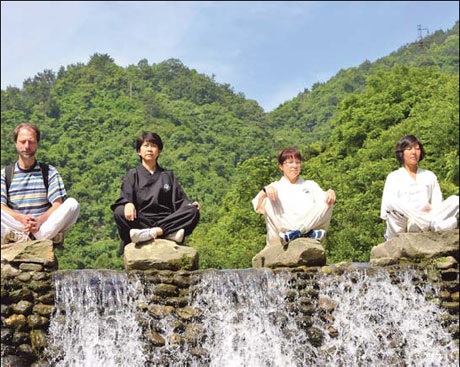|
Zanders-McNeil has been practicing Chinese kungfu for about 10 years. His focus is Wudang jianfa, or Taoist sword techniques.
Besides the demanding routines that include "lots of kicks and difficult stances", he studies the Tao Te Ching, the supreme Taoist canon, and books about Ba Gua Zhang Boxing, a sub-branch of China's Taoist kungfu.
Asked about the benefit of practicing Wudang kungfu he says it benefits the development of one's character and body.
"Physically, you can stay healthy. It keeps your mind focused and gives you a clear awareness of your body and the environment, and of yourself and others."
Although Taoism behind Wudang kungfu is ancient Chinese wisdom, Zanders-McNeil insists that it is relevant to his life.
"The Taoist ideas have a universal meaning. It does not matter whether you come from the East or the West," he says. "If more people were exposed to the Taoist approach, the world would be a better place."
Bjarte Simon Hiley, a young man from Norway, is on a mission. When he was young, Hiley began practicing kungfu under the guidance of his mother and has studied under many kungfu masters.
His mother, Pamela Hiley, the director and founder of Norsk Taiji Senter, in 1983, is widely considered to be one of Europe's most experienced tai chi and qigong instructors and the first professional instructor of kungfu in Norway.
"In Norway, more and more people are interested in learning kungfu, especially tai chi," he says. "Every week, hundreds of students come to learn from my mother at the Norsk Taiji Senter."
A graduate of Beijing Sports University's wushu department, Hiley has for three straight years learned a wide variety of Wudang kungfu skills, both bare-fist and weapon skills. The Ba Xian Gun, or Eight Immortals Staff, is his favorite item.
"My goal is to become an invincible warrior who fights and wins using the tai chi principle - sending back the energy of my enemy to beat him," he explains, adding he will assist his mother when he finishes his studies.
Aside from drawing foreign enthusiasts, the academy also holds a spell over locals who are thirsty for time-tested knowledge and skills such as Taoist ideas and Wudang kungfu.
For instance, each summer, Deng Yinglong, a travel service manager from Yichang, Hubei province takes at least two months off to head for Mount Wudang and "special treatment for body and soul".
The 34-year-old has been intrigued by the poetic and mysterious Wudang kungfu since he saw a TV show three years ago featuring a Wudang tai chi performance by Taoist priests.
This time, Deng took his 5-year-old daughter Deng Yiling, who attended a special class for kids, guided by young Taoist kungfu teacher Ming Zhengwang.
"I am not a lay Taoist practitioner. But I like the atmosphere here very much," says Deng who increasingly feels it is "an indispensable part of my life to have a brief, annual escape from urban life".
|

Four foreign Taoists sit for meditation in Xiaoyao Valley on Mount Wudang.
|
(China Daily 08/24/2010 page18)
|